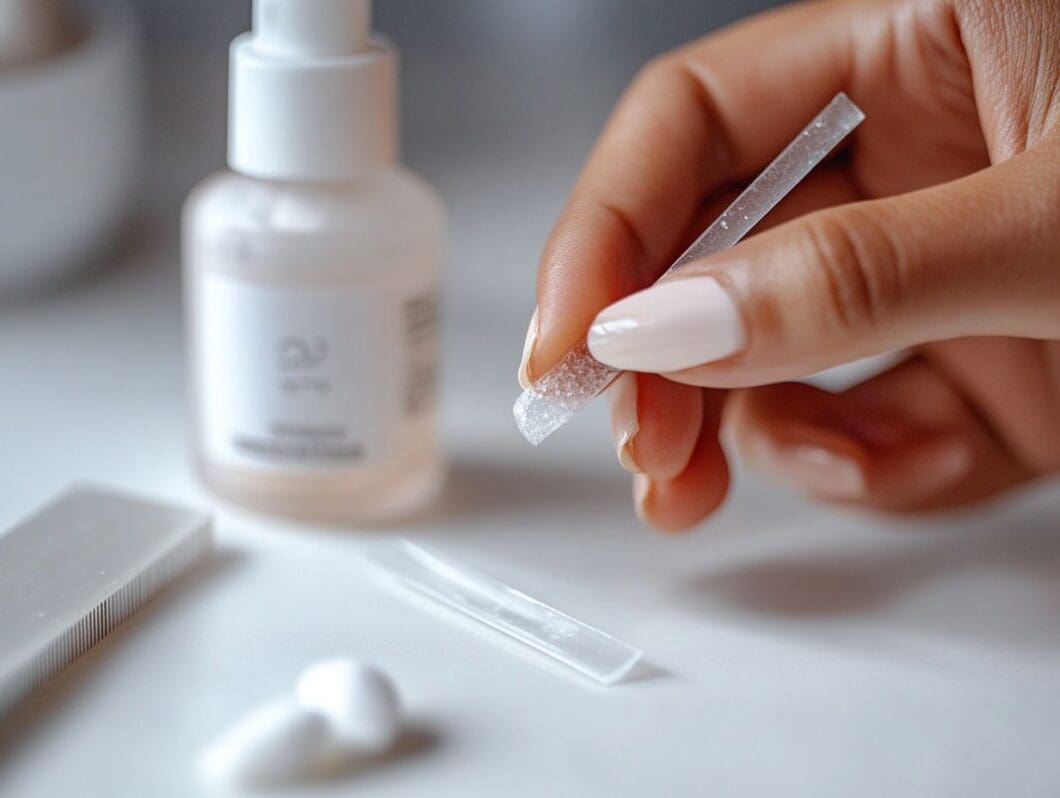Broken nails can be a real annoyance, affecting both your appearance and daily activities. Understanding the causes behind these breaks is the first step in prevention and care.
This article explores everything from assessing the damage and immediate fixes to long-term strengthening techniques.
Whether dealing with a minor crack or a more severe break, practical tips and advice will help you keep your nails healthy and beautiful.
Additionally, guidance is provided on when to seek professional help. Read on to learn how to fix a broken nail without cutting it!
Key Takeaways:
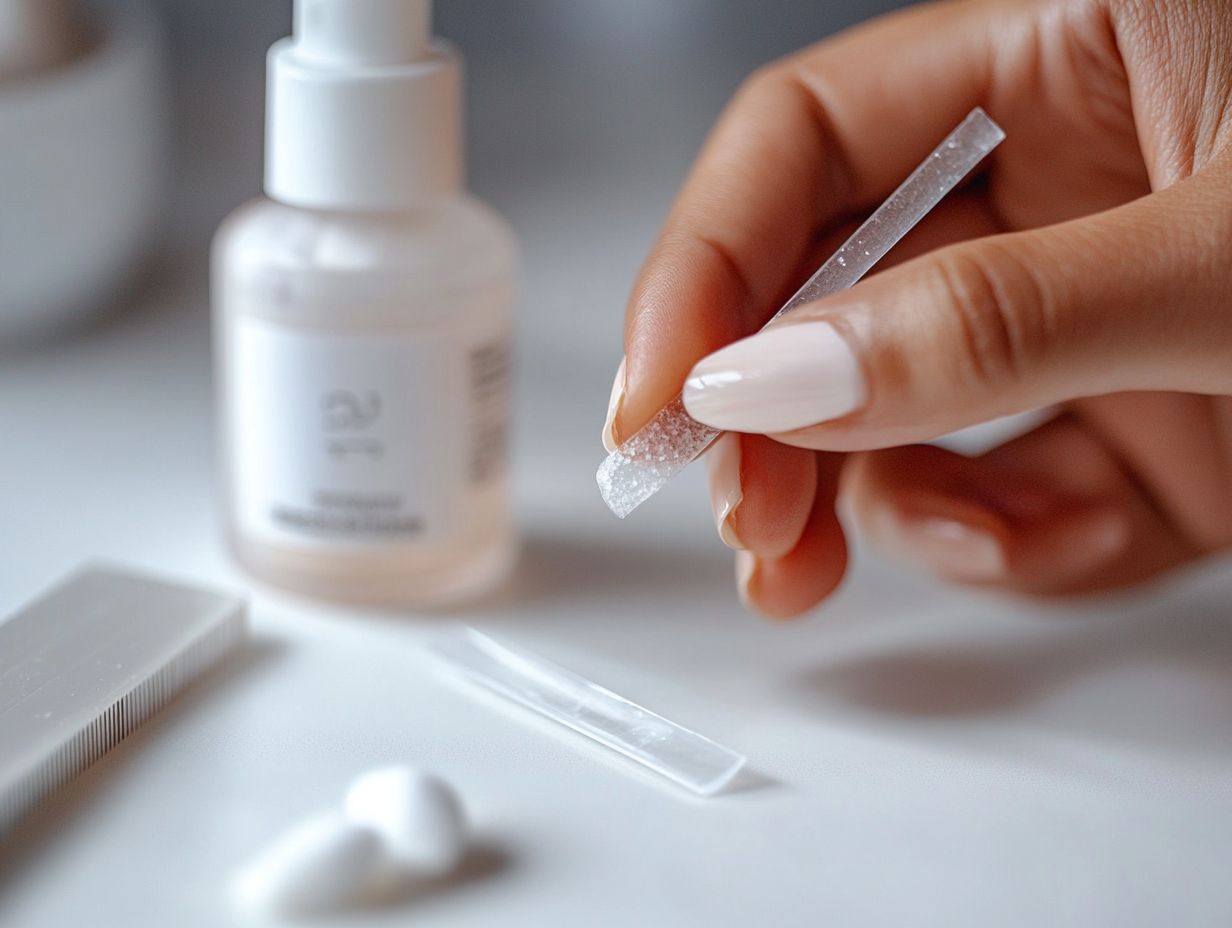
Causes of Broken Nails
Understanding the causes of broken nails is essential for effective nail care and maintenance. Various factors, including inadequate nail hygiene, environmental influences, and improper nail care techniques, can contribute to nail damage. If you have a broken nail, you can learn more about how to fix it without cutting it by visiting this helpful guide.
Additionally, conditions such as brittle nails may exacerbate the issue, resulting in more frequent occurrences of splits and breakage. It is imperative to recognize how artificial nails, nail treatments, and lifestyle choices can impact the strength and health of nails.
By identifying these underlying causes, individuals can take proactive measures to prevent broken nails and promote healthy nail growth.
Possible Causes and Prevention
Several factors can contribute to broken nails; however, understanding these factors can aid in prevention. Regular appointments with a nail technician for treatments, along with the use of products such as nail strengtheners or strengthening serums, are effective strategies for promoting healthy nail growth.
Dietary deficiencies, particularly a lack of biotin, vitamins, and minerals, can significantly compromise nail integrity, rendering them more susceptible to breakage. Environmental factors, including exposure to harsh chemicals, excessive moisture, or frequent handwashing, also play a critical role in maintaining nail health.
Inadequate nail care practices, such as neglecting cuticle hydration or using nails as tools, may exacerbate existing issues. To mitigate breakage, incorporating DIY techniques, such as soaking nails in oils or adhering to a balanced diet rich in essential nutrients, can be advantageous.
Furthermore, prioritizing nail hygiene and the regular application of protective coatings significantly enhances nail resilience, providing a comprehensive approach to ensuring strong and healthy nails.
Assessing the Damage
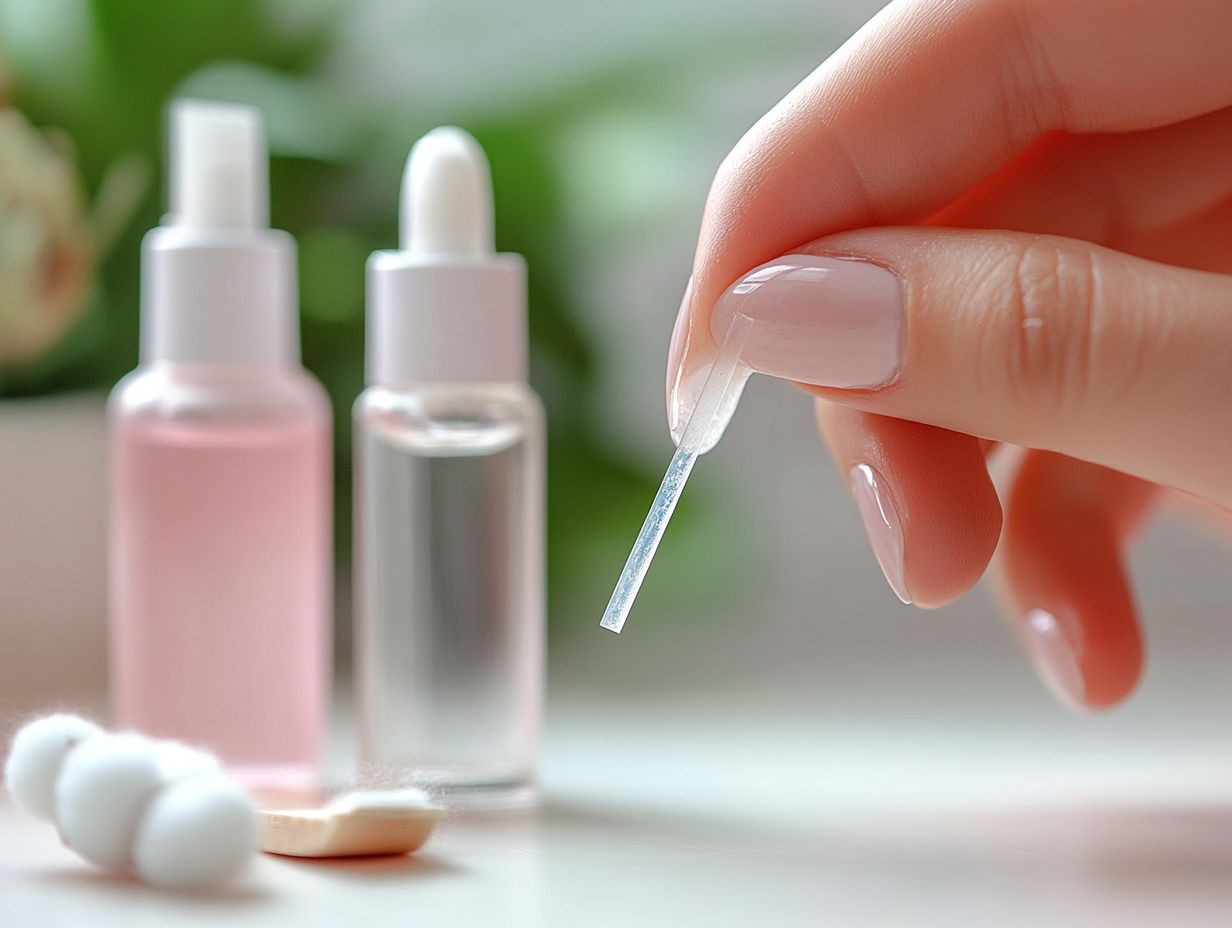
Assessing the extent of damage to broken nails is essential for determining the appropriate treatment methods. Whether one is dealing with split nails, a break at the nail bed, or other forms of nail damage, understanding the severity is critical in guiding the selection of suitable nail care solutions.
A qualified nail technician can evaluate the extent of the damage during a manicure session, providing tailored advice for effective nail repair. It is important to recognize that not all nail damage is uniform and may necessitate different approaches for optimal healing.
Severity and Treatment Options
The severity of a broken nail significantly influences the treatment options available, which can range from simple home remedies to professional interventions. In cases of minor breaks, the application of nail glue followed by a clear polish may serve as a temporary solution, while more severe situations may require advanced nail treatments or the use of a strengthening serum.
For instances of moderate damage, incorporating a nail repair product, such as fiber mesh or an adhesive patch, can provide additional support until the nail fully grows out. It is crucial to maintain cleanliness and moisturization of the affected area to facilitate healing; natural oils, such as jojoba or vitamin E, can be particularly advantageous.
In the case of more serious fractures, seeking specialized treatments at a salon may be necessary. Professionals can employ techniques such as gel acrylics or silk wraps to reinforce the nail, ensuring a resilient appearance while minimizing the risk of further injury. Understanding the appropriate level of care is essential for promoting a swift recovery and maintaining overall nail health.
Temporary Fixes for Broken Nails
Temporary solutions for broken nails can be invaluable when a swift remedy is required to maintain the appearance of the nails. Techniques such as utilizing a tea bag or a coffee filter have been shown to effectively reinforce the nail until appropriate treatment can be administered.
After applying these materials, a clear base coat can provide a polished finish while the nail undergoes the healing process.
Quick Solutions for Short-Term Relief
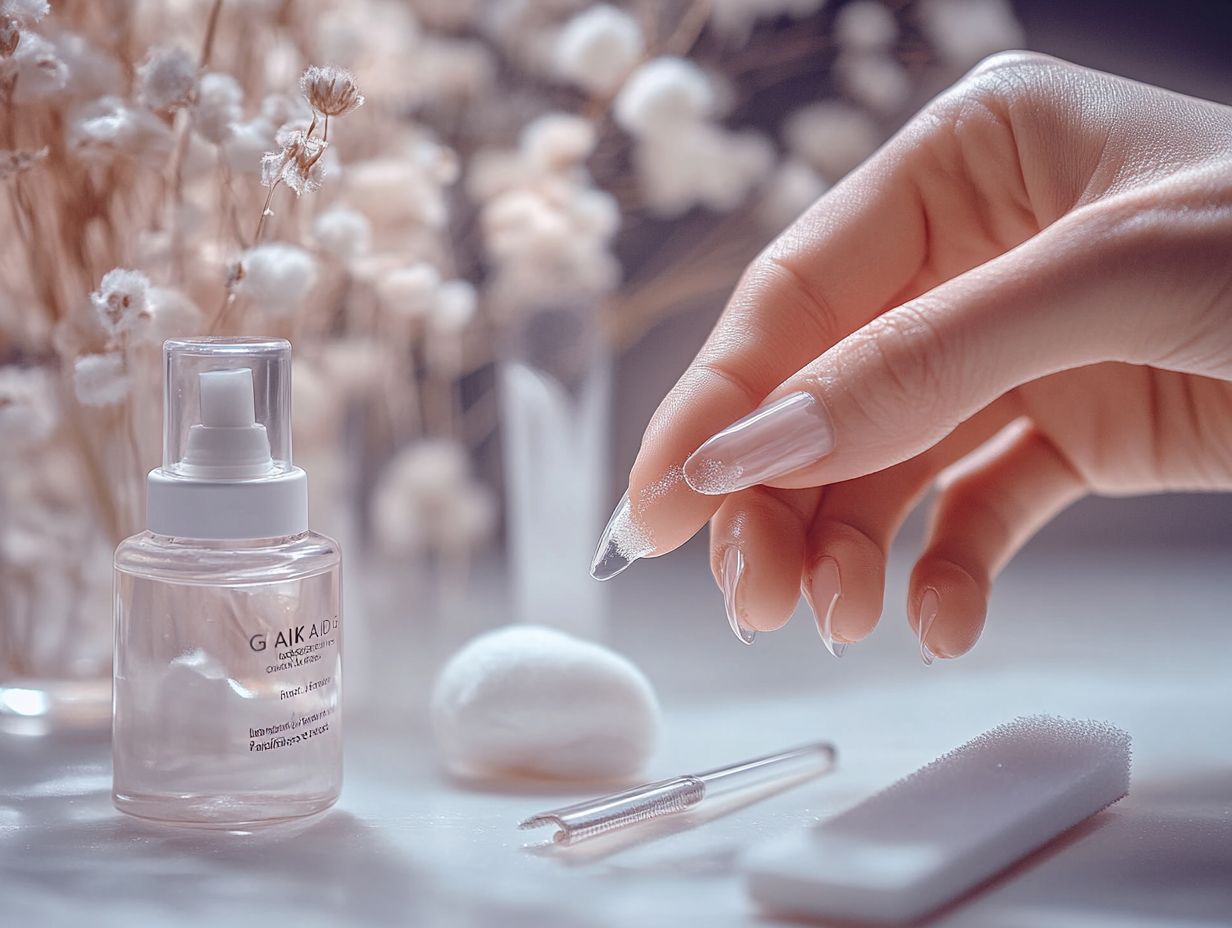
For immediate relief from broken nails, there are several effective solutions that can restore both functionality and appearance. Nail glue can be utilized to mend a broken piece, while the application of cuticle oil helps nourish the surrounding skin. Additionally, gel polish or press-on nails can serve as a quick aesthetic remedy, ensuring that your nails appear polished while they heal.
To effectively use nail glue, it is important to begin by ensuring that both the nail and the broken piece are clean and dry. A small amount of glue should be applied to the broken area, followed by gently pressing the piece back into place until it is secure. Allow the glue to set for a few minutes to achieve optimal adhesion. In the meantime, cuticle oil can be applied generously around the nail bed, with a gentle massage to promote hydration and encourage growth.
Using gel polish provides a durable layer that not only enhances shine but also offers protection to the nail as it heals. Alternatively, press-on nails present a convenient option that delivers an instant boost in confidence without the necessity of professional application, making them particularly suitable for social outings or special events.
Long-Term Solutions for Broken Nails
Long-term solutions for broken nails emphasize the importance of strengthening and promoting healthy nail growth through consistent care and treatment.
Regular consultations with a nail technician for professional treatments can effectively address underlying issues. Additionally, incorporating products such as nail strengtheners and utilizing natural remedies, such as coconut oil, can yield significant benefits over time.
Nail Strengthening and Growth Techniques
To promote nail growth and enhance overall nail health, various techniques and products may be utilized. Regular application of a strengthening serum can significantly improve the resilience of nails, while adhering to proper nail care practices ensures that nails remain in optimal condition regardless of their shape, including almond-shaped nails.
Incorporating biotin supplements into one’s diet may also contribute to healthy nail formation by providing essential nutrients that fortify brittle nails. Regular manicures, which involve gentle buffing and cuticle care, can stimulate circulation and encourage growth.
Additionally, using a nourishing cuticle oil enriched with vitamins offers valuable hydration, helping to prevent dryness and breakage. Maintaining a balanced diet rich in proteins and leafy greens is equally important, as it serves as the foundation for robust nail development. Furthermore, avoiding harsh chemicals in nail polish removers safeguards nail integrity, promoting sustained health and vitality. For more information, check out this guide on how to fix a broken nail without cutting it.
Preventing Broken Nails
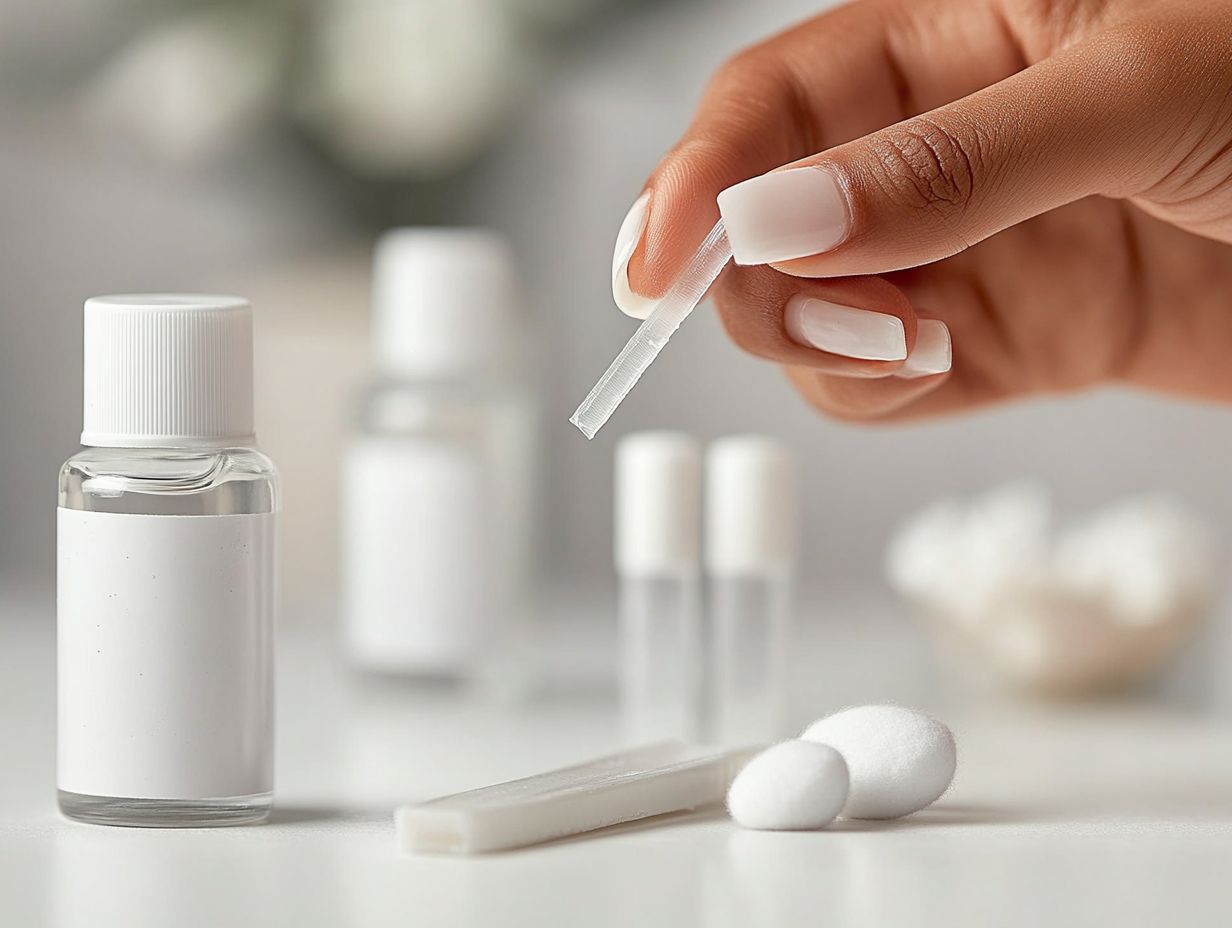
Preventing broken nails is attainable through a dedicated approach to proper nail hygiene and the implementation of consistent nail care routines. Regularly filing nails to maintain their shape, in addition to avoiding harsh chemicals, can significantly mitigate the risk of damage.
Moreover, ensuring that nails receive adequate moisture and nutrition will enhance their overall strength and health.
Tips for Maintaining Strong and Healthy Nails
Maintaining strong and healthy nails requires a combination of effective practices and the utilization of specific products. Regular application of cuticle oil and moisturizer is essential for keeping nails hydrated and resilient. Additionally, adhering to nail hygiene protocols can prevent damage and promote overall nail health. If you ever find yourself with a broken nail, you can learn about proper care in this guide on How to Fix a Broken Nail Without Cutting It.
Incorporating a high-quality cuticle oil, such as jojoba or argan oil, into a daily routine will ensure that the nails remain properly nourished. Utilizing a gentle hypochlorous acid cleanser can effectively eliminate bacteria without stripping the natural oils from the nails. Furthermore, wearing gloves while performing tasks such as dishwashing or gardening can protect the nails from harsh chemicals and environmental stressors.
Dietary habits also play a significant role in nail health; it is advisable to include biotin-rich foods such as eggs and almonds to enhance nail strength. Establishing a weekly routine for trimming and filing nails can prevent snags and breakage, thereby maintaining them in optimal condition.
Professional Help for Broken Nails
Seeking professional assistance for broken nails is an essential step in ensuring effective repair and recovery. Nail technicians possess the expertise to evaluate the extent of the damage and recommend suitable treatments tailored to individual needs.
Whether through specialized nail treatments or expert guidance on nail care, professional support can greatly enhance the healing process.
When to Seek a Nail Technician’s Assistance
Understanding when to seek the assistance of a nail technician is essential for effective nail repair and recovery. If an individual experiences significant nail damage, persistent discomfort, or finds that home remedies are ineffective, it is advisable to consult a professional for expert guidance and appropriate treatments. For those looking for more information on this topic, check out How to Fix a Broken Nail Without Cutting It.
Several scenarios underscore the importance of timely intervention. For example, discoloration or unusual nail shapes may indicate an underlying health issue that necessitates professional evaluation. Additionally, conditions such as ingrown nails or persistent hangnails can lead to infections if left untreated. Regular visits to a nail technician can also benefit those who are frequently exposed to harsh chemicals or environmental stressors.
Being proactive in addressing nail health is crucial, as it allows for the identification and resolution of potential issues before they escalate.


